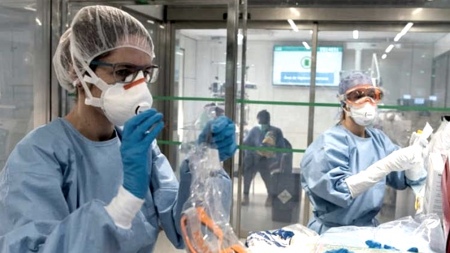58% of female cardiologists suffered gender-based violence in the workplace, according to a survey by the Heart and Women Area of the Argentine Society of Cardiology (SAC), whose conclusions provide new evidence that this situation, together with work overload and inequity in women are additional risk factors for cardiovascular health that enhance the traditional ones such as hypertension, obesity and smoking.
The work -which recently won an award at the 48th Argentine Congress of Cardiology- was carried out in September 2021, had the participation of 611 professionals and showed that workplace gender violence was more frequent in female cardiologists (58% versus 10% expressed by male specialists) as well as domestic violence (16% versus 6%).
“Although we have worldwide statistics, from the Heart and Women Area of the SAC together with the Research Area we carried out this survey among specialists in cardiology and the objective was not only to evaluate the traditional risk factors (high blood pressure, smoking, cholesterol or diabetes), but also other stressors such as labor inequity and gender violence,” interventional cardiologist Bibiana Rubilar de Seggio told Télam.
The work of the SAC revealed that workplace gender violence was more frequent in cardiologists (58% versus 10% expressed by male specialists) as well as domestic violence (16% versus 6%).
In relation to the results, the specialist who directs the area of Heart and Women “Dr. Liliana Grinfeld” of the SAC explained that “The women cardiologists performed shifts with a greater number of hours per day (between 12 and 24 hours) and in this way they were able to group a greater amount of work time to later have more time available at home”.
“Also, 72% of those surveyed considered the workload excessive with remuneration not in accordance with their academic training; and half of the cardiologists considered that motherhood limited professional development, not only to aspire to a position, but also when choosing a specialty,” Rubilar described.
However, 72% would choose the same specialty again and 18% would choose another non-medical profession.

“Unfortunately, gender-based violence at the workplace level was also evidenced in almost 60% by cardiologists and, finally, by women also reported being much more sedentary in terms of lack of time to take care of themselves“, he added.
The results of the survey reveal that sleep cycle disturbances were more frequent among female cardiologists than among males. Also, 5% of all the specialists reported lack of interest, negative thoughts or unhappiness, a more frequent situation in female representatives (7% vs. 3%).
“Non-traditional risk factors have an enhancing effect on traditional ones; in addition, people subjected to these chronic stressors are more likely to develop high blood pressure, obesity, a sedentary lifestyle and depression,” said Verónica Lía Crosa, deputy director of the Area Heart and Woman of the SAC and main author of the investigation.
Crosa argued that all these conditions “in turn operate on self-care, that is, people adhere less to hygienic-dietary guidelines, such as eating a healthy diet, performing physical activity and getting adequate sleep.”
“The women cardiologists performed shifts with a greater number of hours per day (between 12 and 24 hours) and in this way they managed to group a greater amount of work time to later have more time available at home”Bibiana Rubilar of Seggio
“At the same time, these situations can generate a perpetuation of harmful behaviors such as smoking, alcoholism and drug abuse, as described in the literature. Now, taken to the level of medical professionals, it is more serious because the person is trying to provide medical care in an environment that is harmful”he underlined.
The specialist considered “a very important step that a scientific society like the SAC enables the presentation of this type of research” and that it has been awarded “because it implies that it begins to recognize that this situation is happening, something fundamental to generate changes and to that women have access to better working conditions”.
“Some public measures such as Comprehensive Sexual Education (ESI) can also favor the generation of social awareness about the role of women and not promote situations of gender violence and abuse,” he indicated.
For Rubilar, who is also Assistant Secretary of the Argentine Cardiological Foundation (FCA), “among cardiology specialists, risk factors are not very different from those of the general population and the paradox is that, despite handling information, cardiologists take less care of themselves”.

“Dissemination campaigns must be increased so that women are not left behind. Cardiovascular mortality is higher than breast cancer or another type of gynecological cancer and, furthermore, not only do we have conventional risk factors, but as we see in this work to those must be added those intimately linked to gender: violence and work overload,” he emphasized.
The cardiologist explained that “before there was talk of a mortality gap of about 10 years compared to men, but today it is only between 8 and 6 years; you do not have to wait for menopause to do the first controls, you do not have to delay the consultation, must be carried out from the age of 40 annually”. Finally, in relation to the award, he maintained that “from the SAC it gives us great joy, since it means that our own authorities have evaluated the survey, and it is one more step for the problem to be recognized and we can continue working at an integral level for the benefit of Women’s Health”.
-
Attention, containment and advice in situations of gender violence
- By free call 24 hours Line 144
- By WhatsApp +5491127716463
- By mail to [email protected]
- Downloading the apps


















